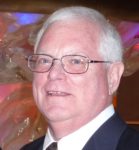
December 18, 2019 by ekurzawa
Filed in: News Tag: Organizer Spotlight
Learn more about ESW
Filed in: News Tag: Organizer Spotlight
Advancing electrical safety in the workplace is the mission of the IEEE IAS Electrical Safety Workshop (ESW). Held annually, the workshop covers a wide range of topics including human factors, technology, standards, regulations, and systems that reduce the risk of electrical injuries. Long-time Conference Organizer, Stephen Wilson, shares that the conference also has the important purpose of addressing “changing work practices and educating workers on the unseen dangers of electricity.”
Wilson has volunteered as an ESW organizer for over 15 years, serving most recently as the Facility and Finance Subcommittee Chair of the IAS Electrical Safety Committee. In his roles, Wilson has several critical responsibilities in supporting the conference including budgeting, site selection, expense management, and conference closing. Planning for the ESW begins well in advance, with the exploration of locations already underway for events taking place as far out as 2024.
As any conference organizer will tell you, managing these responsibilities can often be a balancing act. Before retirement, Wilson often logged hours on nights and weekends. His strategies for managing activities included “developing job procedures, work assignments, and scheduling.” Fortunately, Wilson’s employer “realized the benefit of the ESW to their safety record,” and supported his efforts by allowing him “to spend a few hours a week on ESW work,” he shares. Now as a retiree, he views his involvement as a hobby, even completing work “while sitting on the dock at the cottage.”
ESW looks beyond traditional conference metrics to measure not only its successes but also its impact. Key metrics include a reduction in accident rates at attendee companies, as well as attendee stories of advancing “the electrical safety culture at their workplace,” Wilson says. In addition to these benchmarks, ESW has demonstrated conventional indicators of success including attendance growth, the number of first-time attendees, and surplus.
Time to close has been another win for the ESW, with the 2018 event closing in under 6 months. A common misconception, Wilson shares, is that a conference ends when “everyone goes home.” The treasurer still has valuable work to do to “ensure all invoices are paid.” One of Wilson’s tips to expediting the closing process is “keeping an accurate record of all your revenues and expenses.” It also helps to have IEEE business analysts “reminding you of the deadline,” he says.
In his experience working with IEEE MCE, Wilson has found that there are “some great people to work with and they are usually able to respond to questions quite quickly.” Over the years, Wilson has observed many changes to IEEE procedures, systems, and templates. He looks forward to new tools and resources that will enhance communication with organizers and empower them to be more efficient in their roles.
For Wilson, the rewards of being a conference organizer are many. He takes pride that his contributions to the conference can help “save lives or reduce the number of incidents,” he says. Other satisfying aspects of the role include attendee enjoyment and learning, and when attendees decide to become ESW volunteers. Comradeship among organizing committee members has motivated Wilson’s continued involvement in the ESW event over the years.
Making an effort to get to know the members of the organizing committee is one of Wilson’s words of wisdom to fellow Conference Organizers. He suggests getting to know colleagues beyond just their roles, but on a personal level as well. He sees the Organizer role as an “opportunity to increase your network of people,” both within the industry and at IEEE. Wilson’s parting tip is that despite serving in a voluntary capacity, organizers should value and honor their commitment to “fulfilling a function for your conference.”